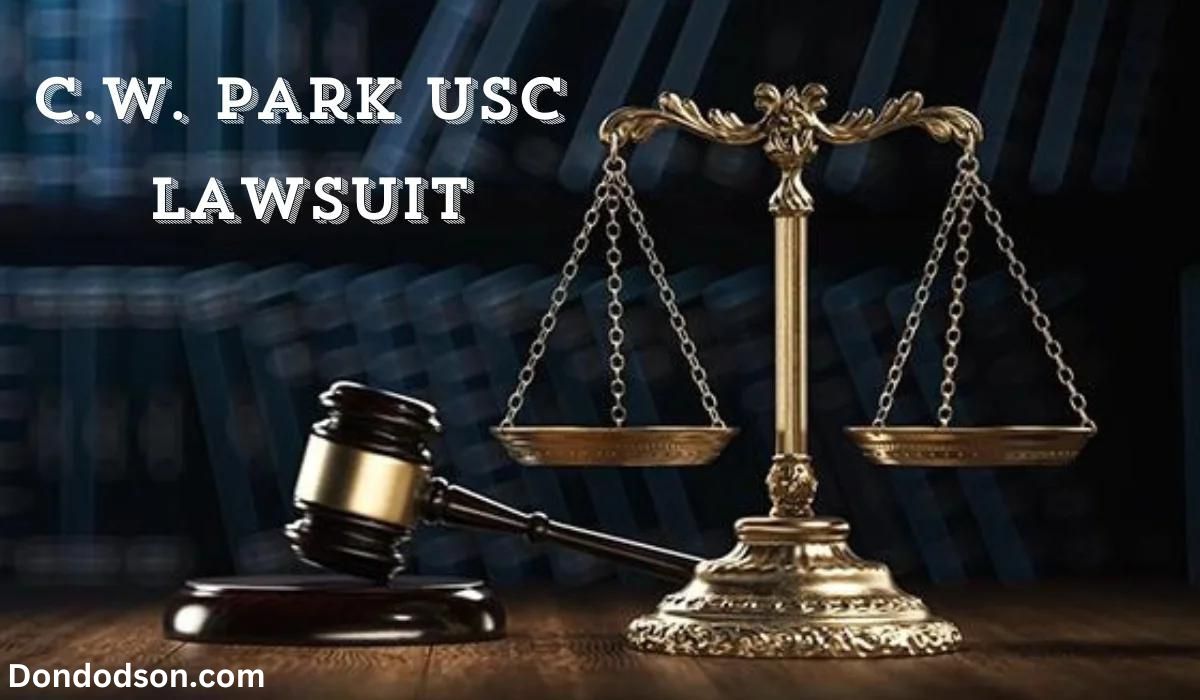I. Introduction
What is the C.W. Park Lawsuit?
The C.W. Park USC lawsuit is a significant legal case that has garnered widespread attention in academic and legal circles. The lawsuit was filed by Dr. C.W. Park, a respected academic and faculty member at the University of Southern California (USC). Park alleges that he was subjected to discriminatory practices, retaliatory actions, and ultimately wrongful termination by the university. The case not only highlights the challenges faced by minority faculty members in higher education but also raises important questions about workplace equality and the responsibilities of academic institutions.
Key Allegations
At the heart of the lawsuit are several serious allegations made by C.W. Park. These include claims of racial discrimination, where Park asserts that he was treated unfairly due to his ethnicity, as well as possible gender discrimination. Additionally, Park alleges that USC retaliated against him when he raised concerns about his treatment, leading to his wrongful termination. The case also involves significant questions about the evidence supporting these allegations and the broader implications for the treatment of minority faculty members in academia.
The Significance of the Case
The C.W. Park USC lawsuit is not just important because of the specific claims it involves; it also has broader implications for how universities handle issues of discrimination, retaliation, and termination. The case has sparked discussions about the responsibilities of academic institutions in fostering inclusive and equitable environments for all faculty members. As the lawsuit progresses, it may set legal precedents and influence how similar cases are handled in the future.
II. C.W. Park’s Background
Academic Credentials
Dr. C.W. Park is an accomplished academic with a strong background in his field. He holds a Ph.D. from a prestigious institution and has contributed significantly to his area of expertise through research, publications, and teaching. Park’s academic credentials have earned him respect within the scholarly community, making his allegations against USC particularly noteworthy.
Tenure Status
At the time of the lawsuit, C.W. Park was a tenured professor at USC. Tenure is a significant status in academia, offering job security and academic freedom. However, it also means that the process of terminating a tenured professor is typically more complex and requires substantial justification. Park’s tenure status adds a layer of complexity to the lawsuit, as it raises questions about whether USC followed the appropriate procedures in his termination.
Previous Experiences
Prior to the events leading to the lawsuit, C.W. Park had a long and distinguished career at USC. These experiences, coupled with his academic achievements, made his allegations of discrimination and wrongful termination even more surprising and concerning.
III. Allegations of Discrimination
Racial Discrimination
Central to the C.W. Park USC lawsuit are the allegations of racial discrimination. Park claims that he was subjected to discriminatory practices based on his ethnicity, which affected his professional opportunities, evaluations, and treatment by colleagues and administrators. Specific instances of alleged discrimination include being overlooked for promotions, receiving unfair performance reviews, and being excluded from important academic discussions and decision-making processes.
Gender Discrimination
In addition to racial discrimination, there may be elements of gender discrimination involved in the case, though this aspect has received less attention in public discussions. If applicable, Park might claim that his gender played a role in the unfair treatment he received. This could include biased assumptions about his capabilities or contributions based on gender stereotypes.
Evidence and Witnesses
Supporting evidence is crucial in any legal case, and the C.W. Park USC lawsuit is no exception. Park has reportedly gathered evidence to support his claims of discrimination, including emails, performance evaluations, and witness testimonies. Colleagues, students, and other faculty members may serve as witnesses, providing accounts of their observations and interactions with Park that support his allegations.
IV. Retaliation Allegations
Actions Taken by USC
Another significant aspect of the lawsuit is the allegation that USC retaliated against C.W. Park after he raised concerns about the discrimination he faced. Retaliation in the workplace can take many forms, including demotion, increased scrutiny, exclusion from key activities, and ultimately, termination. Park claims that after he voiced his concerns, USC took actions that negatively impacted his career and well-being.
Impact on Park
The alleged retaliation had serious consequences for C.W. Park. Professionally, it affected his standing within the university, his ability to perform his duties effectively, and his future career prospects. Personally, the stress and anxiety resulting from the retaliation took a toll on his mental and emotional well-being. The lawsuit contends that this retaliation was not only unjust but also illegal under employment and discrimination laws.
Evidence of Retaliation
To support his claims of retaliation, Park has presented evidence that includes communications from university officials, changes in his job responsibilities, and documentation of actions taken against him following his complaints. This evidence is critical in establishing a pattern of retaliatory behavior by USC, which could significantly impact the outcome of the lawsuit.
V. Wrongful Termination Allegations
Reason for Termination
USC provided specific reasons for C.W. Park’s termination, which may include poor performance, misconduct, or other issues that the university deemed justifiable grounds for dismissal. However, Park disputes these reasons, arguing that they were pretextual and that his termination was actually the result of discrimination and retaliation.
Justification for Termination
The lawsuit challenges whether the reasons given by USC for Park’s termination were legally justified. In cases involving tenured faculty, universities must typically provide clear and compelling evidence that supports their decision to terminate employment. Park’s lawsuit argues that USC failed to meet this standard and that the true motivation behind his termination was discriminatory and retaliatory.
Evidence of Wrongful Termination
Park has compiled evidence to support his claim of wrongful termination, including documentation of his job performance, positive evaluations from students and colleagues, and inconsistencies in the reasons provided by USC for his dismissal. This evidence will be crucial in determining whether Park’s termination was wrongful and whether USC violated employment laws in its actions.
VI. USC’s Response
USC’s Denial
In response to the C.W. Park USC lawsuit, the university has officially denied the allegations of discrimination, retaliation, and wrongful termination. USC maintains that its actions were lawful, justified, and in line with its policies and procedures. The university has stated that Park’s termination was based on legitimate reasons and that it did not engage in any illegal or unethical behavior.
USC’s Defense
USC’s defense in the lawsuit likely includes arguments that challenge Park’s claims and present alternative explanations for the actions taken against him. The university may argue that Park’s performance did not meet the required standards, that there were valid reasons for his termination, and that no discriminatory or retaliatory motives were involved. Additionally, USC may present its own evidence to counter Park’s allegations.
Evidence Presented by USC
In its defense, USC has likely presented evidence that includes performance evaluations, communications between Park and university officials, and any documentation that supports its justification for Park’s termination. This evidence will be examined in court to determine its validity and relevance to the case.
VII. Legal Proceedings
Timeline of Events
The legal proceedings in the C.W. Park USC lawsuit have followed a timeline that includes the filing of the lawsuit, pre-trial motions, discovery, and potentially a trial. Each stage of the legal process involves presenting evidence, making legal arguments, and responding to the opposing party’s claims. The timeline also includes any court rulings or decisions that have been made along the way.
Key Legal Arguments
The main legal arguments in the case revolve around whether USC engaged in discriminatory practices, retaliated against Park, and wrongfully terminated him. Both sides have presented legal theories and interpretations of employment and discrimination laws to support their positions. The court will ultimately decide which arguments are most persuasive based on the evidence presented.
Court Rulings
If the case has progressed to the point of court rulings, these decisions will play a crucial role in determining the outcome. Significant rulings could include decisions on motions to dismiss, summary judgment, or even a final verdict if the case goes to trial. These rulings will impact the legal landscape for similar cases in the future.
VIII. Public Reaction and Media Coverage
Public Opinion
The C.W. Park USC lawsuit has sparked considerable public interest, particularly among those concerned with workplace equality and the treatment of minority faculty in higher education. Public opinion on the case is likely divided, with some supporting Park’s claims and others siding with USC. The case has also generated discussions about the broader implications for academic institutions.
Media Coverage
Media coverage of the lawsuit has been extensive, with news outlets reporting on the allegations, legal proceedings, and the potential impact of the case. The media has played a key role in shaping public perceptions of the lawsuit and bringing attention to the issues of discrimination and retaliation in academia.
Impact on USC’s Reputation
The lawsuit has had a significant impact on USC’s reputation, particularly in light of other controversies the university has faced in recent years. The allegations made by Park have raised questions about the university’s commitment to diversity, equity, and inclusion, and have prompted calls for greater transparency and accountability in how USC handles similar cases.
IX. Implications for Higher Education
Workplace Equality
The C.W. Park USC lawsuit has broader implications for workplace equality in higher education. The case highlights the challenges faced by minority faculty members and raises important questions about how universities can create more inclusive and equitable environments. The outcome of the lawsuit may influence policies and practices related to diversity, equity, and inclusion in academic institutions.
Treatment of Minority Faculty
The treatment of minority faculty members is a central issue in the lawsuit, and the case has brought attention to the experiences of underrepresented groups in academia. The lawsuit has prompted discussions about the need for greater support, protection, and opportunities for minority faculty members to ensure that they are treated fairly and equitably.
Responsibility of Universities
The case also underscores the responsibility of universities to foster inclusive environments and to take allegations of discrimination and retaliation seriously. Academic institutions have a duty to uphold principles of fairness, equity, and justice, and the lawsuit may prompt universities to reevaluate their policies and practices in these areas.
You May Also Like: Dianaperuza in Pop Culture: A Look at Its Influence
Conclusion
The C.W. Park USC lawsuit is a significant legal case that raises important questions about discrimination, retaliation, and wrongful termination in higher education. The case has garnered widespread attention due to the serious allegations made by Park and the potential implications for workplace equality and the treatment of minority faculty members. As the legal proceedings continue, the outcome of the lawsuit will likely have a lasting impact on USC and the broader academic community.
FAQs
What is the C.W. Park USC lawsuit about?
- The lawsuit involves allegations of racial discrimination, retaliation, and wrongful termination against USC by Dr. C.W. Park.
What are the key allegations in the C.W. Park USC lawsuit?
- The key allegations include racial discrimination, retaliation after raising concerns, and wrongful termination.
What is USC’s response to the lawsuit?
- USC denies the allegations, claiming that Park’s termination was based on legitimate reasons and not due to discrimination or retaliation.
What is the significance of the C.W. Park USC lawsuit?
- The case has broader implications for workplace equality, the treatment of minority faculty, and the responsibilities of universities in creating inclusive environments.
How has the public reacted to the C.W. Park USC lawsuit?
- Public opinion is divided, with some supporting Park’s claims and others siding with USC, while the case has sparked discussions on discrimination in academia.











